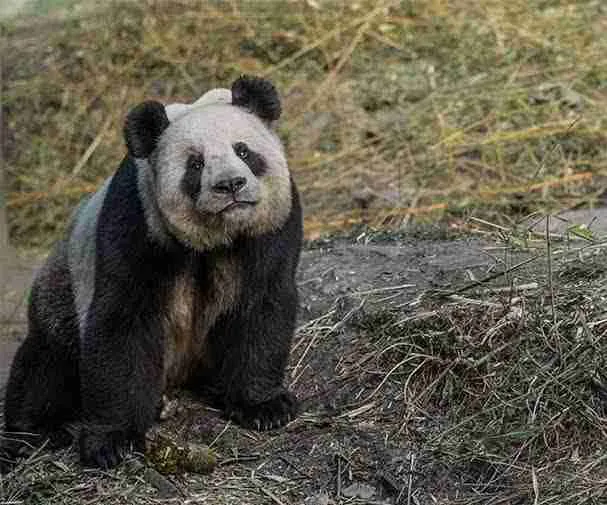Giant pandas face a lot of life-threatening situations.
Although they are no longer on the list of endangered animals, they are still vulnerable to many risks.
Let’s discuss in detail why they still need to be protected!
4 Reasons Why Giant Pandas Need Protection
Recent studies have shown that protecting pandas benefits the country, the environment, and us humans.
Here are some of the reasons why they need protection;
Loss Of Habitat

Habitat loss is a major reason why we need to protect pandas.
It comes in many forms as deforestation, reforestation, and desertification. It may also happen when pandas are taken to breeding programs.
Forest destruction and pollution are a big threat to pandas because they mainly feed on bamboo and when these habitats are cleared, pandas lose their source of food.
So not cutting down bamboo for human needs goes a long way to protecting the population of pandas.
Slow Breeding Rate
Some animals reproduce or have babies at a fast rate, but this is not true for giant pandas.
They just get pregnant once a year after being selective with their mating partner.
And when they get pregnant, they mostly give birth to twins.
The mother panda will end up raising one and allowing the other twin to die off. Some other times, when pandas do not find a suitable mating partner, they stay the year without giving birth.
Going at this rate of reproduction, pandas cannot increase their population faster than they die.
So by introducing more panda reserves, and taking a great number of pandas into captive breeding where they can be artificially inseminated we help protect pandas.
Hunting or Poaching
Hunting and killing pandas have been a major threat to the panda population over the years.
Because they are one of “Asia’s big five” they stand the risk of being hunted and sold out for big money.
Poachers kill them for meat or smuggle their body parts for sale.
Sometimes they capture the baby pandas and trade them as pets.
With regular poaching, every loss is a decline to the panda’s population, and to help save this species, laws, and penalties would be enforced to guide their hunt.
A Shortage of Bamboo
Bamboo is the panda’s favorite meal but it does not have much nutritional value. As a result, pandas need to eat up to 26-84 lbs (12-38 kg) per day.
They do this to meet up their daily energy requirement.
Bamboo leaves can age over time and the little fiber content decreases greatly. This means that the shortage of bamboo can lead to their starvation.
From records, 25 cases of sick or dead pandas over the last 37 years happened during winter (March -April) when bamboo has stopped growing and eventually dies off.
By taking pandas into captivity where they are provided with other foods and fruits to nourish them, we help promote their population.
RECOMMENDED READING: WHY PANDAS ARE BAD AT SURVIVING
Related Questions
How Do Pandas Protect Themselves?
Pandas protect themselves by using their physical abilities, strong teeth, powerful claws, and jaw muscles.
Although they are not easy to prey on, their common predators such as leopards and jackals sometimes run after them or their cubs.
And when that happens, pandas use their natural ability (e.g. swimming or climbing trees) to escape the threat or fight back when necessary.
How Does China Protect Pandas?
The Chinese people have developed several means to protect pandas. Let’s see some of them below.
Habitat Conservation
Chinese people have established about 13 nature reserve areas to help protect pandas’ habitat.
They have also restricted farming in those areas to encourage tree and bamboo growth as well as improve the ecosystem.
Laws and Strict Penalties
Giant pandas are considered China’s “national treasure.”
According to China’s Wild Animal Protection Law, pandas are “first-class protected species.”
Because of their death & smuggling of their body parts, the Chinese government has set rules for their conservation.
The rule penalizes anyone that defaults the order with 10 years imprisonment.
By doing this, pandas are safer and more protected.
Breeding in Captivity, Research, Education, and Returning to the wild
Captive breeding is one of the few ways that the Chinese government has adopted to encourage the population of pandas.
They take pandas from the wild and bring them to panda park for proper feeding and breeding.
Here, pandas become beneficial for study and research purposes. The aim of doing this is to protect and improve the reproduction of giant pandas.
How Does The Government Protect Pandas
It is one of the government’s duties to ensure that pandas are well protected.
They can do that by doing the following:
Increasing The Land Extent Where Pandas Inhabit
The government should set out more land for pandas’ nature reserves.
These areas should be places that are potentially far from human activities such as construction.
Furthermore, they can create ways that help pandas connect even if they live in separate habitats.
This way, their reproduction will improve because they can easily move from one habitat to another during mating seasons.
Creating new facilities for reserve management.
The facilities in National parks and pandas reserve areas have to be functional and well-maintained.
Encouraging sustainable logging
The government should encourage teaching and public awareness programs.
This educates people about the need for sustainable use of the forest.
Local communities should be enlightened about the importance of maintaining a clean and safe environment while using the forest.
Preventing illegal hunting, and trespasses into the pandas’ habitat
Rules and regulations that govern the use of the forest would be made and anyone caught defaulting these rules will be punished.
The laws would not just exist in the constitution, but they should be enforced to guide the poaching and hunting of pandas.
How Can You Protect Pandas?
It is not the work of the government alone to protect pandas, we can also save pandas in the little ways possible.
- Attending training on wildlife conservation, sustainable logging, and ecotourism.
- Donating to Panda training centers and World Wide Fund for Nature (WWF).
- Educate young people in learning about giant pandas.
Final Thoughts
To recap, pandas need our protection because of:
- Slow breeding
- Hunting/ Poaching
- Loss in Habitat
- Diet
These factors have affected them so much, and have killed a lot of pandas.
However, the government and individuals are in a good position to protect pandas and encourage their population.
People can find alternative sources of energy, and the government can improve the extent of pandas’ habitat.
Now that you know the reasons why pandas need our protection, would you like to know how they survive?
Check out our article “What Do Giant Pandas Need To Survive?” to find out

